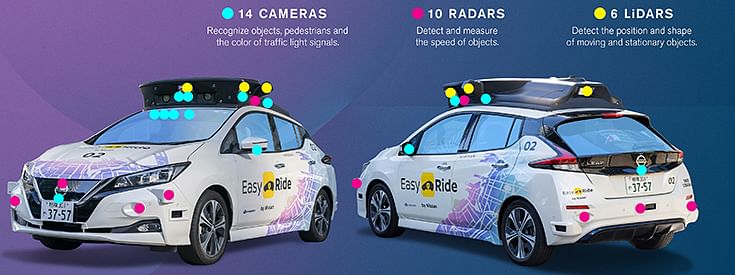Nissan begins trials of autonomous EV on public roads in Japan
The Nissan Leaf prototype vehicle incorporates 14 cameras, 10 radars and 6 Lidar sensors, significantly expanding the detection area and enabling more accurate detection of its surroundings.
Nissan has commenced demonstrations of a prototype vehicle equipped with its in-house-developed, autonomous drive technologies, showcasing progress in its goal towards rolling out autonomous mobility services within fiscal year 2027.
The Nissan Leaf prototype vehicle, which incorporates 14 cameras, 10 radars and 6 Lidar sensors, demonstrates the Japanese carmaker’s progress in the field of autonomous driving, particularly within complex urban environments. Compared to earlier prototypes the company has demonstrated, the latest test vehicle features an array of roof-mounted sensors, significantly expanding the detection area and enabling more accurate detection of its surroundings.
 An array of roof-mounted sensors significantly expand the detection area for the prototype Leaf and enable more accurate detection of its surroundings.
An array of roof-mounted sensors significantly expand the detection area for the prototype Leaf and enable more accurate detection of its surroundings.
As a result, recognition performance, behavioural prediction, and judgement functions, as well as control functions have been enhanced, delivering smooth operation in a variety of complex scenarios. Around the busy streets of Yokohama, close to Nissan’s global HQ in Japan, the Leaf prototype, according to the company, “is able to smoothly demonstrate its ability to predict the behaviour of pedestrians, conduct lane changes when merging, and judge when to safely enter intersections.”
Nissan has been studying business models for future mobility services since 2017. While the current demonstration is being conducted at SAE Level 2 equivalent with a safety driver present, the company aims to continue to expand functionality and to begin offering autonomous-drive mobility services within Japan, starting in fiscal year 2027, working with third parties such as local authorities and transport operators.
In the fourth quarter of this fiscal year, Nissan aims to begin trials in the Minato Mirai area, and plans to progress to service demonstration tests within fiscal year 2025. During the trials, the level of autonomous driving functionality will be gradually increased while assessing customer acceptance, with the aim to provide driverless services.
This initiative is being conducted in close cooperation with the Japanese Ministry of Economy, Trade and Industry; Ministry of Land, Infrastructure, Transport and Tourism; and other central ministries. The ministries will also promote initiatives to realize new autonomous mobility services at the Level 4 Mobility Acceleration Committee that they organize.
Nissan states that its long-term vision is to empower mobility by solving transportation service issues faced by local communities. Local communities, particularly within Japan, have been facing several mobility challenges, such as driver shortages, which are a result of an ageing population.
RELATED ARTICLES
Aisin to produce hybrid motor for Mitsubishi in Thailand
The hybrid drive motor and gearbox, will be produced at Aisin Powertrain (Thailand) Co for use in the Mitsubishi XForce ...
GM reports strong Q1 sales in China, demand for EVs and hybrids surges 53%
General Motors and its joint ventures in China have sold more than 442,000 units between January and March 2025.
Volkswagen to invest $580 million in Argentina, plots new pick-up truck for South America
Volkswagen is paving the way for the next generation of mid-size pick-up truck as a successor to the Amarok. The new mod...






 By Autocar Professional Bureau
By Autocar Professional Bureau
 03 Jun 2024
03 Jun 2024
 3071 Views
3071 Views




























